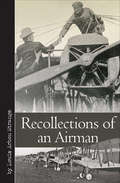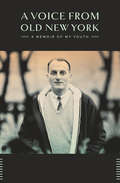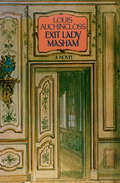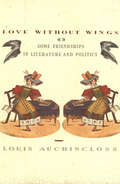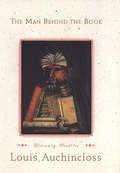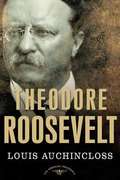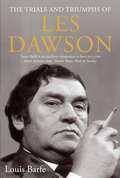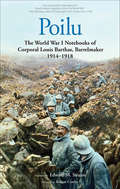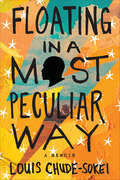- Table View
- List View
Recollections of an Airman (Vintage Aviation Library)
by Louis Arbon StrangeThis candid WWI memoir takes readers inside the cockpit with an RAF officer on the Western Front from the outbreak the Great War until its end in 1918. Louis Arbon Strange was at the Royal Air Force&’s Central Flying School when war broke out in 1914. He immediately reported to Royal Flying Corps headquarters and joined No. 5 Squadron. Strange remained on active duty throughout the war, serving his country over the Western Front from August of that year until the enemy&’s surrender. Strange transferred to No. 6 Squadron in 1915 and went on to form and command No. 23 Squadron. Due to illness, he did not accompany his squadron to France, but spent that time training others. He took charge of the Machine-Gun School at Hythe and other schools of aerial gunnery before returning to the Front. There he commanded the 23rd Wing and finally took command of the 80th Wing from June 1918 until the end of the war. As Strange chronicles his experiences, he provides unique insight into how and why the Allied airmen eventually prevailed.
A Voice from Old New York: A Memoir of My Youth
by Louis AuchinclossAn &“entertaining and occasionally even moving&” personal recollection by the lawyer, historian, and renowned chronicler of old-money WASP society (The Boston Globe). At the time of his death, Louis Auchincloss—enemy of bores, self-pity, and stale gossip—had just finished taking on a subject he had long avoided: himself. His memoir confirms that, despite the spark of his fiction, Auchincloss himself was the most entertaining character he ever created. No traitor to his class, but occasionally its critic, Auchincloss returns to his insular society, which he maintains was less interesting than its members admitted—and unfurls his life with dignity, summoning family (particularly his father, who suffered from depression and forgave him for hating sports) and intimates. Brooke Astor and her circle are here, along with glimpses of Jacqueline Onassis. Most memorable, though, is Auchincloss&’s way with those outside the salon: the cranky maid; the maiden aunt, perpetually out of place; the less-than-well-born boy who threw himself from a window over a woman and a man. Above all, here is what it was like to be Auchincloss, an American master, a New York Times–bestselling novelist, and a rare, generous, lively spirit to the end. &“[Auchincloss] concentrates on bringing back to life—literary alchemy, after all—the people who loved him: his mother, father, aunts, uncles, school friends and colleagues. He understands how lucky he was to have them, and &‘A Voice From Old New York&’ is his thank-you note.&” —The New York Times
Exit Lady Masham: A Novel
by Louis AuchinclossIn this witty historical novel by the author of Watchfires, a poor woman joins the eighteenth-century court of Queen Anne and ends a war.On the Continent, John Churchill, Duke of Marlborough, is laying waste to the lowlands in a bloody combat with Louis XIV. Meanwhile at the British court, Queen Anne, aging, ill, and surrounded by sycophants, is coping with the intrigues of those who wish to promote Marlborough’s dangerous ambitions. Chief among the plotters is his headstrong wife (and court favorite), Sarah Churchill.Into this tense and steamy environment comes young Abigail Hill, Sarah’s impoverished cousin. Sarah has arranged for her to be a maid to the Queen. But Abigail will discover that she has been marked by destiny for a special mission, which is nothing less than to bring to a halt a destructive world war. How she accomplishes this is the subject of this unusual but historically justified tale . . .The drama of court life and high politics, the growing antagonism between Sarah and Abigail, and an engaging cast of characters make for a lively narrative. And the portrait of Queen Anne is a tour de force that lends further depth to this vivid and engaging book.Perfect for fans of the Yorgos Lanthimos film, The Favourite, starring Olivia Coleman and Emma Stone.
Love Without Wings: Some Friendships in Literature and Politics
by Louis AuchinclossThe author of The Vanderbilt Era examines sixteen famous friendships, from Boswell and Johnson to Hawthorne and Melville.This delightful series of short essays explores friendship in its various forms—from true intimacy to professional detente between rivals. The friendships, literary and political, span two continents and three centuries—Boswell and Johnson, Fitzgerald and Hemingway, Richelieu and Father Joseph, FDR and Harry Hopkins, Edith Wharton and Margaret Chanler—sixteen sketches in all.Auchincloss approaches his subjects with grace, tact, and insight, subtly defining the peculiar, gentle chemistry on which platonic bonds depend. The result is a surprising array of social patterns and personal destinies, all stemming from the simple desire for human company.
The Man Behind the Book: Literary Profiles
by Louis AuchinclossInformation about the following authors: CYRIL TOURNEUR, PROSPER MERIMEE, ANNE BRONTE, DUMAS fils, LORD BRYCE, WALTER PATER, JOHN WALTER CROSS, HENRY JAMES, SARAH ORNE JEWETT, ROBERT GRANT, THE ABBE MUGNIER, F. MARION CRAWFORD, HAROLD FREDERIC, PAUL HERVIEU, ROBERT HERRICK, AMY LOWELL, L. COMPTON-BURNETT, ELINOR WYLIE, HAROLD NICOLSON, MAXWELL ANDERSON, S. N. BEHRMAN, ROBERT E. SHERWOOD and Iris Origo.
The Man Behind the Book: Literary Profiles
by Louis AuchinclossTwenty-three biographical essays on writers admired by the National Medal of Arts–winning author of The Education of Oscar Fairfax.For Louis Auchincloss, life and letters are not two things but one. It therefore comes as no surprise that when he writes about writers, their lives are considered as closely as their works. He takes what today is a refreshingly unpopular position: that the artist and his art cannot be teased apart, that biography of criticism and criticism biography. For Mr. Auchincloss, it all boils down to that maxim of Buffon’s: “the style’s the man,” the man behind the book.The twenty-three writers discussed here are a mixed lot—English, American, and French; novelists, poets, and playwrights; Jacobeans, Victorians, and moderns—yet each has meant a great deal to Mr. Auchincloss as a reader and a writer. Some of them are classics, and familiar Auchincloss subjects: Sarah Orne Jewett, Henry James, Ivy Compton-Burnett. Others, among them Prosper Merimee, Harold Frederic, and Amy Lowell, were famous once but are now obscure. In their cases it is Mr. Auchincloss’s self-described task “to explore the reasons for their fall from grace,” reasons that prove to be unfailingly personal as well as artistic. But as Mr. Auchincloss would rather praise and share than damn and dismiss, it is also his task “to seek the portions of their work that may still merit attention.”Alfred Kazin once noted that Mr. Auchincloss’s essays are marked by “perfect literary grace and wit.” These qualities have never been so evident as in this volume, an informal study of some of the author's favorite books and the fascinating artists behind them.
Theodore Roosevelt
by Louis AuchinclossIn depth biography of the first American President of the twentieth century.
Woodrow Wilson
by Louis AuchinclossWoodrow Wilson sheds new light on Wilson's upbringing and career, from the grim determination that enabled him to overcome dyslexia to the skillful dance of isolationism and intervention in World War I to the intransigence that--despite his most cherished vision--caused the Senate's rejection of the League of Nations. Here, from the dynamic figure whose ringing speeches hypnotized vast crowds to the gentle voice reading poetry aloud and the comic star of family skits and charades to the rising academic and president of Princeton who made the giant leap into politics are all the triumphs and final tragic irony of this flawed apostle of world peace. Our twenty-eighth president was, says Louis Auchincloss, "the greatest idealist who ever occupied the White House." And who better than Auchincloss, with his penchant for quirky personalities and fascination with fin-de-sicle society, to explore this complex persona?
The Trials and Triumphs of Les Dawson
by Louis BarfeThe first ever narrative biography of a towering figure in British comedy Les Dawson, more than any other comedian, spoke for the phlegmatic, pessimistic British way of life. A Northern lad who climbed out of the slums thanks to an uncommonly brilliant mind, he was always the underdog, but his bark was funnier and more incisive than many comics who claimed to bite. Married twice in real life, he had a third wife in his comic world—a fictional ogre built from spare parts left by fleeing Nazis at the end of World War II—and an equally frightening mother-in-law. He was down to earth, yet given to eloquent, absurd flights of fancy. He was endlessly generous with his time, but slow to buy a round of drinks. He was a mass of contradictions. In short, he was human, he was genuine, and that's why audiences loved him. This is his story.
Poilu: The World War I Notebooks of Corporal Louis Barthas, Barrelmaker, 1914 – 1918
by Louis Barthas&“An exceptionally vivid memoir of a French soldier&’s experience of the First World War.&”—Max Hastings, New York Times bestselling author Along with millions of other Frenchmen, Louis Barthas, a thirty-five-year-old barrelmaker from a small wine-growing town, was conscripted to fight the Germans in the opening days of World War I. Corporal Barthas spent the next four years in near-ceaseless combat, wherever the French army fought its fiercest battles: Artois, Flanders, Champagne, Verdun, the Somme, the Argonne. First published in France in 1978, this excellent new translation brings Barthas&’ wartime writings to English-language readers for the first time. His notebooks and letters represent the quintessential memoir of a &“poilu,&” or &“hairy one,&” as the untidy, unshaven French infantryman of the fighting trenches was familiarly known. Upon Barthas&’ return home in 1919, he painstakingly transcribed his day-to-day writings into nineteen notebooks, preserving not only his own story but also the larger story of the unnumbered soldiers who never returned. Recounting bloody battles and endless exhaustion, the deaths of comrades, the infuriating incompetence and tyranny of his own officers, Barthas also describes spontaneous acts of camaraderie between French poilus and their German foes in trenches just a few paces apart. An eloquent witness and keen observer, Barthas takes his readers directly into the heart of the Great War. &“This is clearly one of the most readable and indispensable accounts of the death of the glory of war.&”—The Daily Beast (&“Hot Reads&”)
Floating In A Most Peculiar Way: A Memoir
by Louis Chude-SokeiThe astonishing journey of a bright, utterly displaced boy, from the short-lived African nation of Biafra, to Jamaica, to the harshest streets of Los Angeles—a searing memoir that adds fascinating depth to the coming-to-America storyThe first time Chude-Sokei realizes that he is &“first son of the first son&” of a renowned leader of the bygone African nation is in Uncle Daddy and Big Auntie&’s strict religious household in Jamaica, where he lives with other abandoned children. A visiting African has just fallen to his knees to shake him by the shoulders: &“Is this the boy? Is this him?&”Chude-Sokei&’s immersion in the politics of race and belonging across the landscape of the African diaspora takes a turn when his traumatized mother, who has her own extraordinary history as the onetime &“Jackie O of Biafra,&” finally sends for him to come live with her. In Inglewood, Los Angeles, on the eve of gangsta rap and the LA riots, it&’s as if he&’s fallen to Earth. In this world, anything alien—definitely Chude-Sokei&’s secret obsession with science fiction and David Bowie—is a danger, and his yearning to become a Black American gets deeply, sometimes absurdly, complicated. Ultimately, it is a boisterous pan-African family of honorary aunts, uncles, and cousins that becomes his secret society, teaching him the redemptive skill of navigating not just Blackness, but Blacknesses, in his America.
Recollections of the Private Life of Napoleon -- Volume 01
by Louis Constant WairypubOne. info present you this new edition. Though this work was first published in 1830, it has never before been translated into English. Indeed, the volumes are almost out of print. When in Paris a few years ago the writer secured, with much difficulty, a copy, from which this translation has been made. Notes have been added by the translator, and illustrations by the publishers, which, it is believed, will enhance the interest of the original work by Constant.

